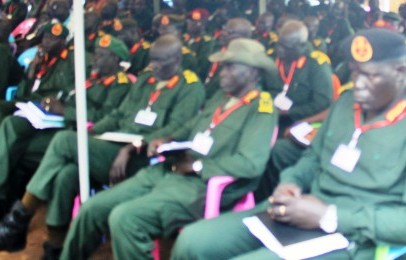South Sudan’s opposition army considers inclusivity
March 13, 2016 (ADDIS ABABA) – Inclusivity in the opposition forces is a guiding principle in building a national army for the country, said a media official of the South Sudan’s armed faction of the Sudan People’s Liberation Movement (SPLM-IO).

While President Kiir will command the current government’s army, the opposition leader, Machar, as First Vice President will command the opposition army. There will be security sector reforms implemented, including trainings, before their gradual reunification.
Critics have however expressed doubts whether the talked about reforms will come to light particularly in the two armies given the continued domination by the two major tribes in the country, the Dinka and the Nuer.
Media official in the opposition’s group however said on their part they have a policy to accommodate diversity even in the army.
“A policy of the leadership of the SPLM/SPLA (IO) for building a future national army of South Sudan includes promoting equality and diversity. Inclusivity is a guiding principle,” James Gatdet Dak, opposition leader’s press secretary, told Sudan Tribune.
But he added that it will always be difficult, if not impossible, to implement the policy of the diversity involving all the ethnic groups in South Sudan in terms of equal numbers and ranks of the military personnel and officers.
Dak was responding to mixed reactions on social media where discussants from tribes across South Sudan are divided between those who commended and criticized the list of the recent preliminary deployments of senior officers of the opposition faction which was published on Thursday.
Discussants in different groups on social media facebooks and blogs seen by Sudan Tribune, and who criticized the deployments, said overwhelming majority of the senior officers came from the Nuer ethnic group, where Machar hails.
Many of them went as far as condemning the selection processes of the officers, adding that it had no difference from the actions of President Salva Kiir’s government which is dominated by his ethnic group, the Dinka.
Others criticized the publication of the list itself, saying it should not have been published for the public to view it. They argued that the publication has made it possible for the public to read the names and recognize their ethnic groups, preferring that it should have been kept as a secret from the public knowledge in order to avoid the exposure and negative criticisms.
Reached by Sudan Tribune for reaction, Dak said the commendable public comments supporting the publication or constructive criticisms against it were welcomed as “contributions of views in advocating for the implementation of the security sector reforms, including diversity in the national army.”
He however added that many other critics had “emotionally and negatively reacted too soon” but should have given themselves time to properly get informed about what transpired and waited for next deployments.
The preliminary list released on Thursday, he explained, was about commands of the sectors and divisions based in Greater Upper Nile region, predominantly inhabited by the Nuer ethnic group who also happened to have joined the opposition forces in big numbers, “constituting over 90% of foot soldiers and officers in the area.”
He said senior officers in the two other regions of Greater Equatoria and Greater Bahr el Ghazal have not yet been deployed to the army sectors and divisions in the areas they are based, saying this will be done “soon” by the leadership.
Dak however emphasized that unlike a number of scholarships for studies which can be distributed in equal numbers to students from different regions, states, counties or ethnic groups if so decided, enrolling in the army is mainly a voluntary decision of the individual from any ethnic group, state or region.
“We should not expect each and every ethnic group in South Sudan to have equal or similar big numbers of soldiers and officers and ranks in the army. This is impossible and unnecessary,” he emphasized.
“Also we don’t have a policy of forceful conscription,” he added.
Since military deployments are mainly based on seniority, he explained that those who are seniors in the military hierarchy head top commands in their respective structures or departments.
He further added that the top leadership of the SPLM-IO was trying his best to fill the gap through the promotions of officers from the minority tribes.
This included, he said, a policy of an affirmative action in composition of a future category of a special force to be selected from all the different states of the country.
During the October 2015 leadership conference in Pagak, for instance, he said, Machar had directed respective leaderships of the 21 proposed federal states to contribute from each and every state a certain equal numbers of soldiers who will be trained together and compose a future exemplary diverse presidential guards force.
The two years old violent conflict erupted on 15 December 2013 between the Tiger presidential guards who were almost all from the two ethnic groups of the Dinka and the Nuer and had to easily split on tribal lines.
(ST)
